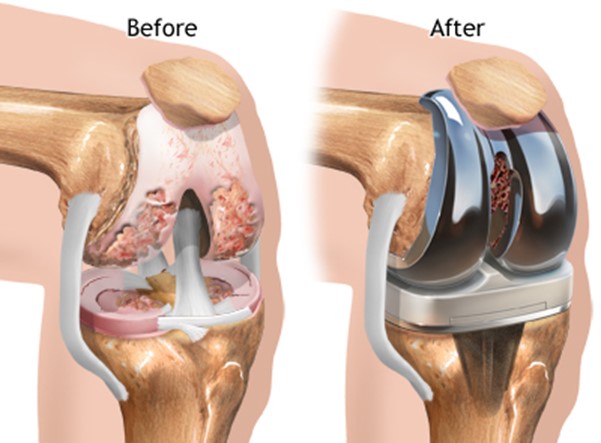A nurse is teaching a client how to manage edema following knee replacement surgery. Which of the following interventions should the nurse include in the teaching?
Apply ice packs for 15 minutes every hour.
Elevate the affected leg above the heart level.
Consume nutrition-dense foods first.
Wear compression stockings during the day.
The Correct Answer is B
Choice A reason: Applying ice packs for 15 minutes every hour is not an effective intervention for managing edema following knee replacement surgery because it can impair blood circulation and delay healing. Ice packs can also cause frostbite or nerve damage if applied for too long or too frequently. Ice packs should be used only for the first 24 to 48 hours after surgery and with a cloth barrier between the skin and the ice.
Choice B reason: Elevating the affected leg above the heart level is an effective intervention for managing edema following knee replacement surgery because it can reduce swelling and pain by facilitating venous return and lymphatic drainage. Elevation can also prevent blood clots and infection by improving blood flow and oxygen delivery to the wound site.
Choice C reason: Consuming nutrition-dense foods first is not a relevant intervention for managing edema following knee replacement surgery because it does not directly affect fluid balance or wound healing. Nutrition-dense foods are those that provide high amounts of nutrients per serving, such as eggs, cheese, nuts, beans, and meat. Nutrition-dense foods are important for overall health, but not specifically for edema management.
Choice D reason: Wearing compression stockings during the day is not a recommended intervention for managing edema following knee replacement surgery because it can interfere with wound healing and increase the risk of infection. Compression stockings can also cause skin irritation, blisters, or ulcers if worn incorrectly or too tightly. Compression stockings should be avoided until the wound is fully healed and only used under medical supervision.

Nursing Test Bank
Naxlex Comprehensive Predictor Exams
Related Questions
Correct Answer is A
Explanation
Choice A reason: Scrambled eggs are a good food choice for a client who has difficulty chewing due to ill-fitting dentures because they are soft, moist, and easy to swallow. Scrambled eggs also provide protein, iron, and vitamin B12 for the client.
Choice B reason: Tuna fish is not a good food choice for a client who has difficulty chewing due to ill-fitting dentures because it may contain bones, skin, or scales that can cause discomfort or injury to the gums or mouth. Tuna fish should be avoided or checked for bones and skin before consuming.
Choice C reason: Roast beef is not a good food choice for a client who has difficulty chewing due to ill-fitting dentures because it is tough, dry, and hard to chew. Roast beef can cause pain, fatigue, or choking for the client who has ill-fitting dentures. Roast beef should be avoided or cut into very small pieces and moistened with gravy or sauce before consuming.
Choice D reason: Apple slices are not a good food choice for a client who has difficulty chewing due to ill-fitting dentures because they are crisp, firm, and sticky. Apple slices can dislodge or damage the dentures or cause irritation or infection to the gums or mouth. Apple slices should be avoided or cooked until soft and mashed before consuming.
Choice E reason: Dried fruit is not a good food choice for a client who has difficulty chewing due to ill-fitting dentures because they are chewy, sticky, and sugary. Dried fruit can adhere to the dentures or teeth and cause dental caries or gum disease. Dried fruit should be avoided or soaked in water until soft and cut into small pieces before consuming.
Correct Answer is C
Explanation
Choice A reason: Including a high-fat food with each meal is not a good strategy for managing chronic nausea during pregnancy because it can delay gastric emptying and worsen nausea and vomiting. High-fat foods should be avoided or consumed in moderation during pregnancy.
Choice B reason: Drinking 12 ounces of water with breakfast is not a good strategy for managing chronic nausea during pregnancy because it can dilute stomach acid and trigger nausea and vomiting. Water should be consumed between meals rather than with meals during pregnancy.
Choice C reason: Eating a high-carbohydrate diet is a good strategy for managing chronic nausea during pregnancy because it can provide quick energy and prevent hypoglycemia, which can cause nausea and vomiting. Carbohydrate-rich foods, such as crackers, toast, rice, and cereal, can also absorb stomach acid and reduce nausea and vomiting.
Choice D reason: Lying down for an hour after eating is not a good strategy for managing chronic nausea during pregnancy because it can cause acid reflux and worsen nausea and vomiting. It is better to sit upright or walk for a few minutes after eating during pregnancy.
Whether you are a student looking to ace your exams or a practicing nurse seeking to enhance your expertise , our nursing education contents will empower you with the confidence and competence to make a difference in the lives of patients and become a respected leader in the healthcare field.
Visit Naxlex, invest in your future and unlock endless possibilities with our unparalleled nursing education contents today
Report Wrong Answer on the Current Question
Do you disagree with the answer? If yes, what is your expected answer? Explain.
Kindly be descriptive with the issue you are facing.
